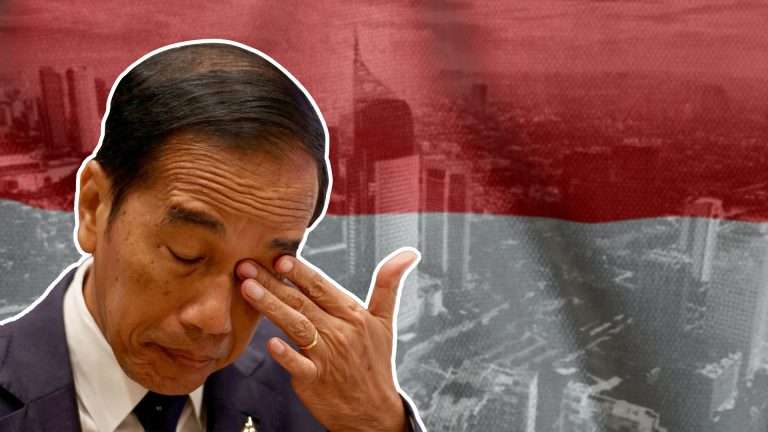A report from the world's third largest democracy.
In the world of politics, the voters love you until they don’t—and the lesson not to take them for granted is always learned the hard way. Never has this been more true than in the fall from grace of Indonesia’s departing President Joko Widodo.
Growing up working-class, he experienced home eviction and near-bankruptcy before becoming a successful furniture exporter in the 1990s. A French client supposedly shortened his name to Jokowi. He became a successful mayor and then the governor of Jakarta in 2012, where he continued his common-touch leadership. He built a reputation for cracking down on bureaucratic corruption.
This star of the center-left PDI-P (Partai Demokrasi Indonesia Perjuangan, or Indonesian Democratic Party of Struggle) won the 2014 presidential election and got everything right politically for the last ten years. He ended Islamist terrorism, after the specter of bombings in the province of Bali in 2002 and 2005 had cast a long shadow.
The rising middle class of Indonesia thought he was on their side. Indonesia was a “Tiger Cub” economy, and advancing in tech. Faster and more affordable Internet connection ended the long tradition of media piracy, which also benefited domestic artists and local applications.
The 2019 presidential election was a rematch of 2014, where Jokowi beat conservative former general Prabowo Subianto, and then surprisingly recruited Prabowo as the Minister of Defense. The appointment weakened Islamic conservatism as a political power, while the bourgeois Left, who had denounced Jokowi as a Macron-like centrist before the re-election, remained confined to online discourse, without a political party or public figures.
Like other leaders, Jokowi faced the ultimate test of pandemic policies and post-pandemic recovery, and Indonesians trusted him throughout the storm. Normality resumed by 2023, and it looked like he would complete his last year in office in his usual good form.
The Fall
It started as a little discomfort. The Directorate General of Taxes announced that starting in January 2024, the tax file number would be replaced by the citizen’s ID number. This was supposed to be simple and convenient, but citizens had to fill out online documents manually instead of the system synchronizing automatically. The public didn’t take it well and saw it as either a sign of the DGT’s unwillingness to do its job or an attempt to extract more personal information from citizens.
And yet, still a tolerable inconvenience. In February, Prabowo won his presidential bid in partnership with Jokowi’s son, Gibran Rakabuming, with 59% of votes, as many Indonesians were happy with how things were, and the other candidates presented themselves as anti-Jokowis who would undo his legacies.
The feel-good moment peaked in May when Indonesia men’s soccer team reached the semifinals of the Asian junior championship and almost qualified for the Olympics. And then the fall began.
First, the government imposed a new customs rule that limited the amount of clothes, shoes, and electronics that returning Indonesians could bring in, then backtracked following a month of public outrage. Next, the government went ahead with the plan to allocate 3% of white-collar salaries into a public housing fund, effective in 2027. People felt that they were being squeezed.
Finally, the new capital of Indonesia. Jakarta (the current capital) is nobody’s favorite, but instead of moving the capital to the outskirts, or to the city of Bandung like the Dutch colonial government planned a century ago, in 2019 Jokowi insisted on building a new city on the eastern coast of Borneo, supposedly at the center of the archipelago.
The development of Nusantara began in 2022, with the deadline of inauguration on the Independence Day of August 17, 2024. They didn’t make it. Jokowi presided over his final Independence Day celebration in an unfinished city, looked at by many as emblematic of failure. The mess was not over yet for him and Indonesia. The Constitutional Court and the other branches of the government were at odds over the minimum age of gubernatorial candidates, which was seen as a ploy to include 29-year-old Kaesang Pangarep, Jokowi’s younger son, in the race to lead Jakarta. While Jakarta was facing protests, Kaesang’s wife uploaded pictures from Los Angeles, including the view from her Gulfstream and a $25 lobster roll from Broad Street Oyster, earning her the nickname Marie Antoinette.
Not One of Us Anymore
Politicians live and die by their solidarity with the middle class, along with token attention for the poor and the working class. Jokowi played this well for more than a decade, before deciding to throw it away this year. While Indonesians were still reeling about coming home with extra shoes and pants that the customs might scrutinize, an older video came out depicting Kaesang and his wife Erina stepping out of their private jet with shopping bags that passed no customs inspection. So much for the hero of anti-corruption.
The aspirational middle class felt they’d been taken for a ride. They were overtaxed, with government waste on full display. Why build a new capital instead of simply moving to Bandung? Nusantara, the new city, might be safe from earthquakes, volcanic eruptions, and tsunamis, but it offers little else for the people of Indonesia. It’s not a city that Indonesians want or need.
The departing Minister of Finance, Sri Mulyani, claimed that Indonesia must exceed a 5% annual growth rate just to escape the middle-income trap. But how would more taxation (or even an inefficient system synchronization) encourage growth? And why should Indonesia go beyond middle-income?
Jokowi ends his presidency on October 20, with his former enemy Prabowo Subianto taking over and his son Kaesang on the sidelines. He could have ended it gracefully and been remembered as Indonesia’s best president of all time. Instead, he leaves a legacy of waste and self-dealing.

